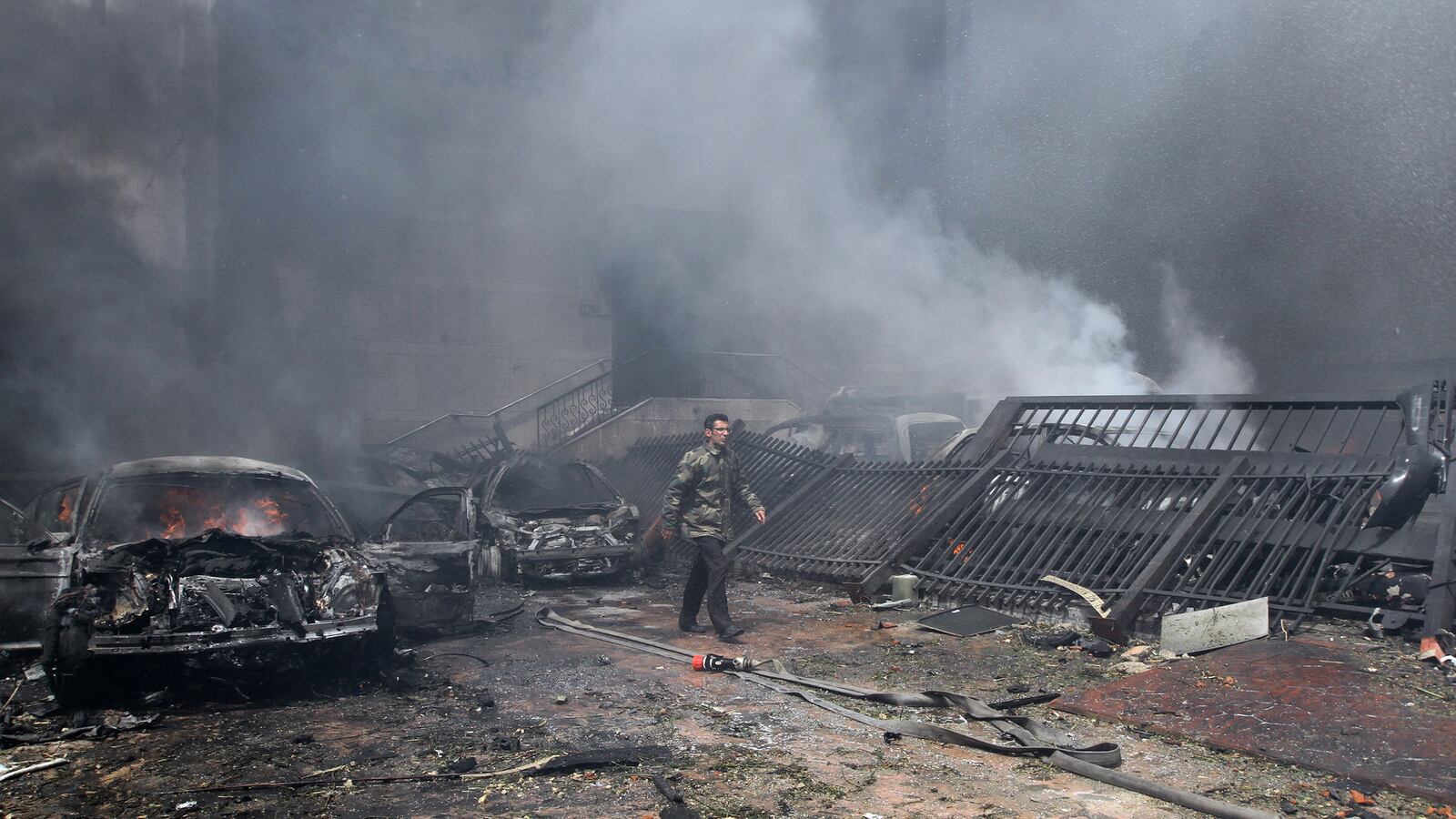Secretary of State John Kerry told reporters yesterday that an “unbelievably small, limited” attack on Syria will prevent Assad from using chemical weapons again and force the regime to the negotiating table.

“Unbelievably” is the key word. Kerry probably doesn’t believe this himself—and neither should anyone else. Ever since the Obama administration set out to sell Congress and the public on the idea of a military strike on Syria, it has tried to describe the action with what diplomats call “creative ambiguity.” In the advertising business, such language used to be called “weasel words”: phrases that can be understood very differently by different people.
Vague and misleading verbiage has its uses in, say, an effort to revive Arab-Israeli peace talks, which long ago wandered into the shadow land of tricky contractual language. And, of course, it leaves the door open to potentially happy surprises, like the diplomatic flurry that started with a seemingly offhand remark by the secretary of State on Monday when Kerry said that any potential U.S. strikes could be halted if the Assad regime immediately surrendered its stockpiles of chemical weapons to international control. The Russians seemed to back the idea, and President Obama, if understandably wary, offered a rhetorical way out by declaring: “We are going to run this to ground.”
But until now, the Obama administration’s use of creative ambiguity has been wildly destructive. The American public was led into the blood-drenched deserts of Iraq for eight disastrous years by the George W. Bush administration’s half-truths and outright lies. President Obama might think he deserves to be viewed differently, but when it comes to launching missiles, dropping bombs, and putting lives on the line, ambiguity just won’t do.
Maybe we should just forget about Syria. The American record of meddling in the Middle East is so consistently disastrous for the region and for the United States that that’s a perfectly legitimate argument to stay out.
But we shouldn’t delude ourselves. We now “own” that cursed war. Over the last few weeks Obama and Kerry have made sure of that. They have doubled down, again and again, betting the prestige of the presidency and the nation on the need to do ... something in Syria. Yet they haven’t told us what that something would be, and they have not presented a convincing case about where the conflict will lead.
Probably when Obama decided to go to Congress and the international community for support, he and Kerry thought they could create a powerful momentum for action that would give them the initiative diplomatically as well as militarily. But they haven’t won over Congress. They haven’t won over the international community. And tonight Obama will try to win over the American people. He may fail with them as well.
No doubt Obama will talk, once again, about the importance of red lines drawn against the use of grotesquely cruel chemical weapons and about the importance of American credibility.
What the rest of us should do is draw our own red lines against ambiguity.
First of all: no lies, no half-lies, no weasel words—if there are good reasons for attacking Syria, let’s be clear about what they are. The humanitarian argument is not compelling. The world is full of atrocities, and war, even a war to end a war, is never a humanitarian enterprise until the victors write the history. A war to prolong a war as a stalemate until somebody in the international community decides to do something more forceful, or until both sides are bled dry, is cynical and immoral. Unfortunately, that may be the thinking that underlies administration policy and which it does not want to say out loud.
Secondly, there should be no attempt to carry out symbolic actions. Politicians in Washington may think of slaughter in semiotic terms, but the people on the ground never do. They just see death and destruction. Again and again, over the years, successive American administrations have punished dictators by terrifying their subjects with bombing raids and cruise missile attacks, then left the dictators in place. It is better to take no action than to take symbolic action.
Thirdly, Obama should be frank about the “credibility” issue. The core of the problem is whether Israel believes Washington can be believed. Obama and President Bush before him have been hard-pressed to convince the Israelis that the United States will not allow Iran to build a nuclear arsenal under any circumstances. That red line is critical to Israel’s survival. If Obama does not enforce the red line against chemical weapons that he drew in Syria, how can he be trusted to enforce the one against nuclear weapons in Iran? A shadow of doubt could tempt Israel to launch a war against Iran—it has gamed out that possibility many times. And if Israel starts that fight, as both the Bush and Obama administrations feared, the United States would be left to finish it.
Finally, no window should be left open for the American occupation of Syrian territory. The greatest of the many great mistakes of the Bush administration was not the removal of the tyrant Saddam Hussein in Iraq, it was the refusal to admit that when the United States achieved that goal, it would be sucked into a lengthy, armed occupation of the country. “Boots on the ground” is a code word for “occupation forces,” and those should definitely be ruled out. If there is no credible way to achieve American goals in Syria without such an occupation, then the United States should stay out of Syria altogether.






